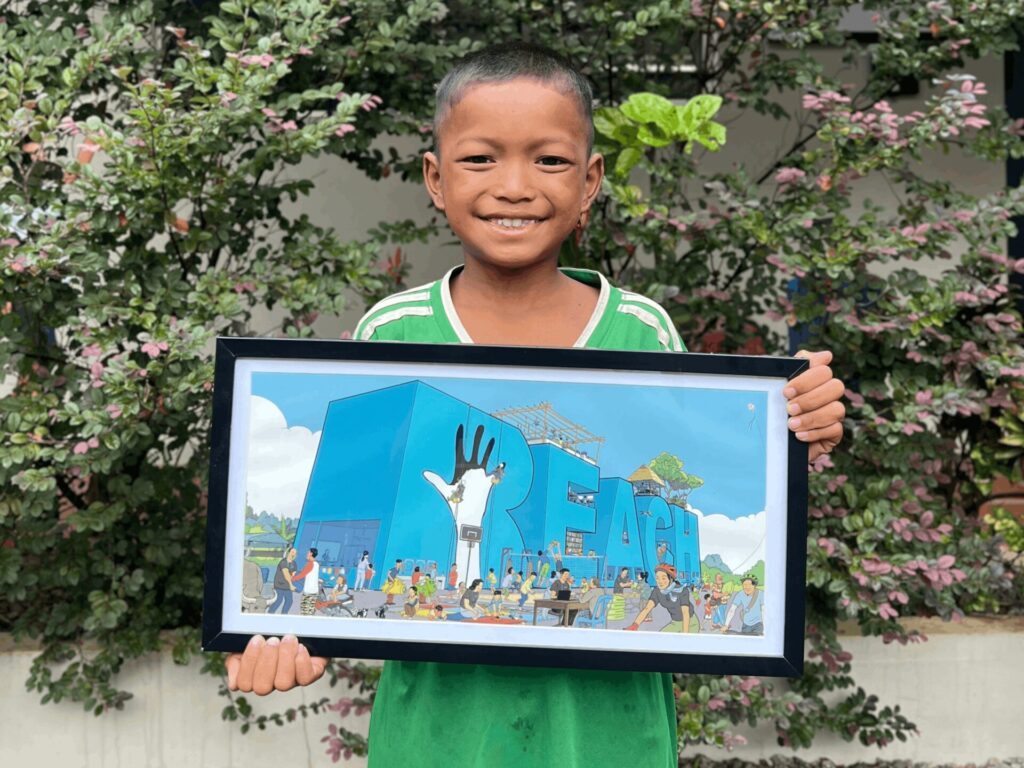Every day, our students come into our REACH Siem Reap school grounds, eager and excited to learn, play, and thrive.
We believe that education should be much more than just learning the traditional standard subjects; it should also be about the holistic development of each individual. As such, our education programs and electives cover the foundations and offer supplementary subjects that are not taught in the public-school curriculum.
Through incorporating creative classes, we aim to provide a space for imagination that is just as important for a child’s growth as any academic subject, ensuring that our students receive a well-rounded education.
Cambodian Public School: Core Academics Focused
In Cambodia, the curriculum in public schools is often strictly focused on academic basics. Due to limited resources and crowded classrooms, creative arts are usually excluded from the daily schedule.
According to the Ministry of Education’s 2024–2028 Strategic Plan, the focus for the coming years is heavily on core academics such as math, science, and STEM education. Even though this is an important step for Cambodia’s development, it means that arts and creative subjects are often left out of the daily 4-hour school schedule.
Organisations like UNESCO have also recognised that without dedicated art training for teachers, many children never get to experience the benefits of a creative education, which is exactly where REACH steps in.
We have made it part of our mission to fill this gap. To supplement the standard curriculum, our REACH community and pedagogy have cultivated an environment where imagination is encouraged, and every child has the freedom to discover who they are through art.
Our commitment to creativity begins the moment our students walk through the gate, where every wall in our school inspires them every day.
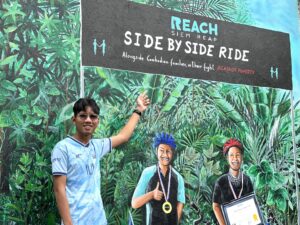
Our student in front of the Side by Side mural.
REACH’s Murals by Giuliano Turello
If you walk through our school today, you will immediately feel the vibrant energy. Giuliano’s murals and artwork that adorn our school have been commissioned by a generous supporter who has independently funded the beautiful array of art. His murals have brought our walls to life, transforming empty white spaces into stories of hope and aspirations.
From paintings of bicycles in front of our REACH Riders Club’s shed to the evolution of a child’s journey through our Side by Side cycling challenge, every corner has colorful moments woven together to define who we are as a community.
Our students are always curious about the drawings on their classrooms’ walls and seeing Giuliano’s work has sparked their interests every day. These murals serve as a constant reminder to the kids that they can use art to express their ideas and tell their stories to the world.
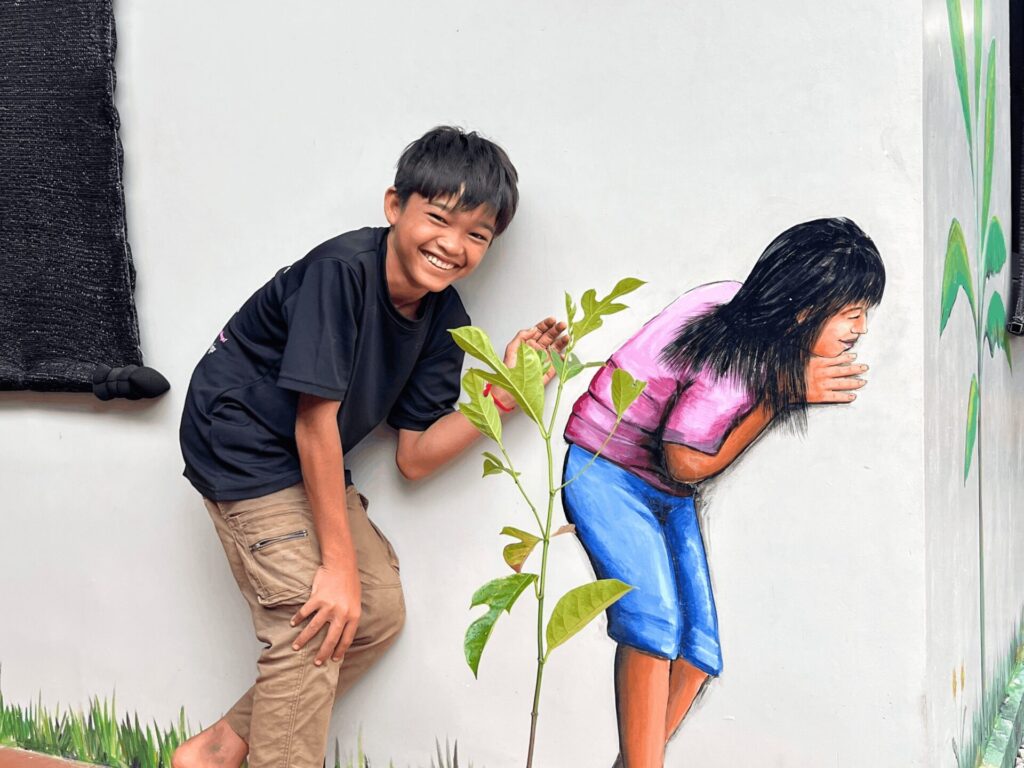
A REACH student posing next to one of Giuliano’s murals.
Commemorating 5 Years of REACH: The Joshua Cam Cam’s Artwork
Last year marked a significant milestone as we celebrated our 5th anniversary of empowering youth. To honour this journey, the incredibly talented Joshua Cam Cam generously created and donated a custom artwork to REACH.
This piece perfectly captures our holistic vision, supportive community, and ambitious goals for the families we serve. We love the artwork so much that we have featured the design on our latest REACH t-shirts.
Joshua reflects that, “On my last visit, I was really impressed by REACH and the work they do for the community. So, I wanted to show everything about their programs as much as possible. I like to draw pieces that make you look at them for a very long time before you see everything. This painting does exactly that, and by donating this artwork to REACH, I wanted to show the students that their own stories – the things they see every day in Siem Reap –are worth sharing with the world.”
Both Giuliano and Joshua’s creative pieces inspire all of us, and we also want to instill in our students the passion for artistic expression.
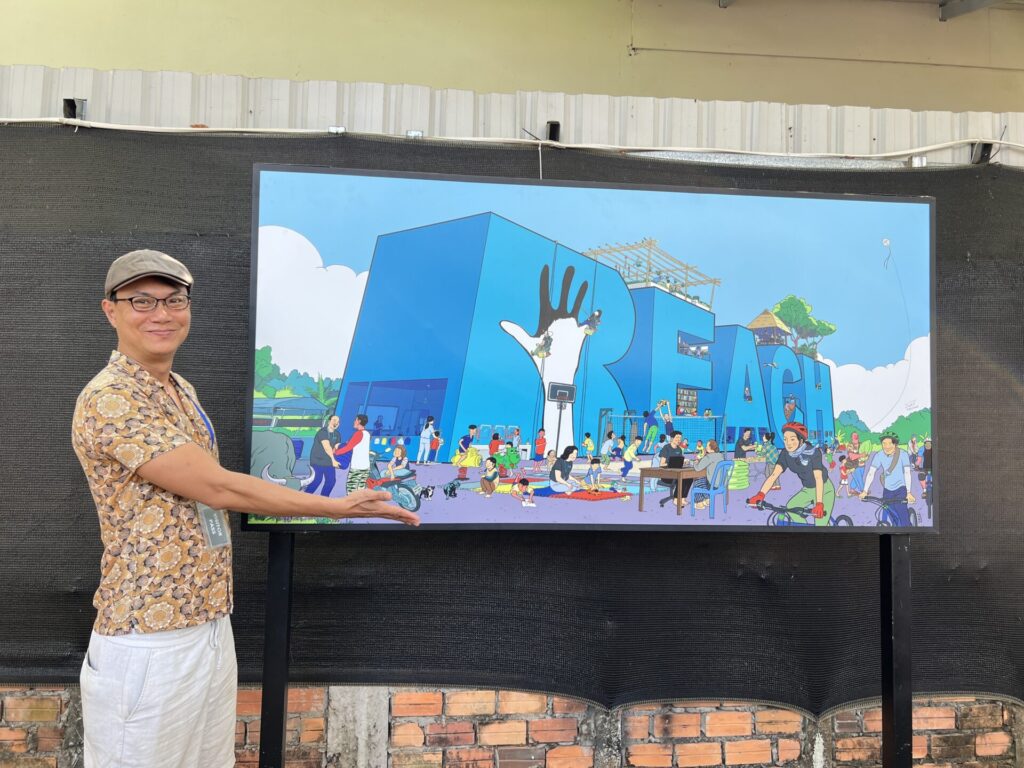
Joshua Cam Cam standing next to his REACH artwork.
Arts and Expression at REACH
Creativity requires both guidance and resources. At REACH, we are proud to provide an art education every single week to our students.
Because of the impoverished conditions that our families live in, the majority of the kids at our school don’t have the means to afford basic art supplies. These resources are also not available for them at their public school. Through the support of our class sponsors and our global community, we can provide essential tools, including coloured papers, colour pencils, and other supplies necessary for our creative art sessions.
Our classrooms encompass diverse learning styles and value the importance of art in early childhood development. Each art session is designed to help our young learners explore and expand their creative imagination.
When the children enter our art class, their energy changes. They aren’t afraid of making mistakes here – they are just excited to show what is inside their minds. For an hour every week, through drawings, crafts, colouring and painting, our students actively engage themselves with new concepts and ideas.
Through these valuable lessons, our students not only produce beautiful works that they can be proud of, but they also learn to express themselves, build their confidence, and develop their analytical skills.
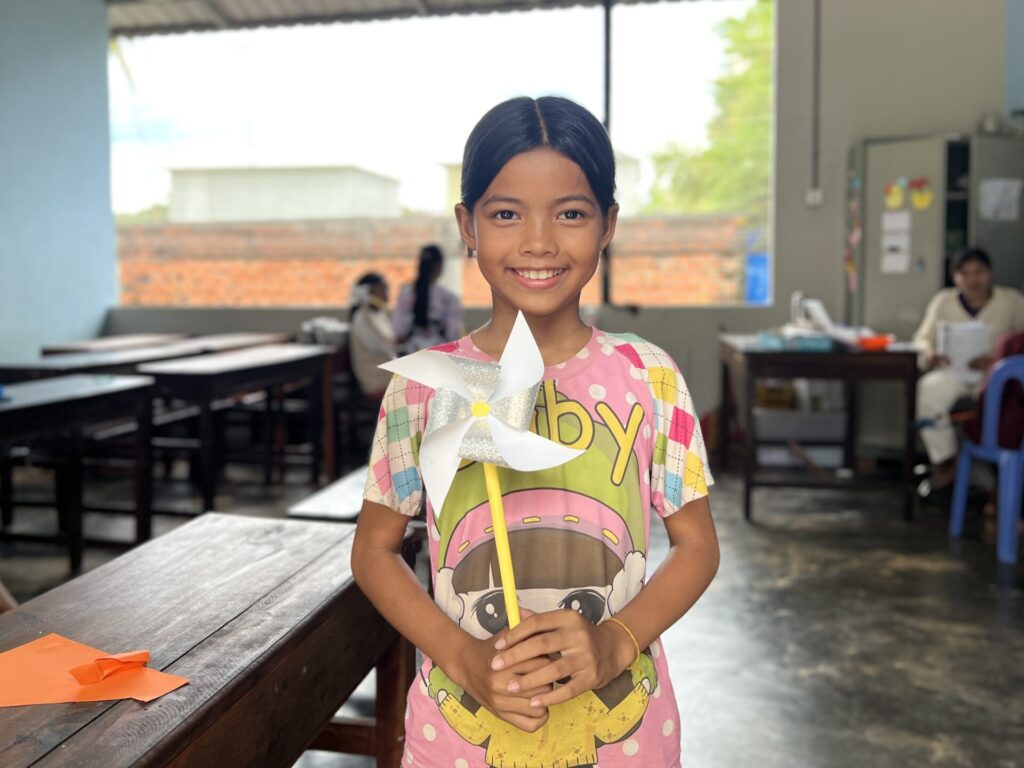
Our student in the classroom, holding her craft.
Many of our art elective sessions have been made possible by the unwavering support of the Rotary Club of Cranbourne.
The Rotary Club of Cranbourne is a proud sponsor of our Yellow Room Morning class. Cathy & Peter and other Rotarians from the club have been so helpful in helping us improve our art elective. Each year, Cathy and Peter travel to Cambodia, bringing essential art supplies, and they have volunteered tirelessly to help our team develop structured art lesson plans. Their contribution ensures that our art elective is a sustainable, high-quality part of our curriculum.
Thank you Cathy & Peter and the Rotary Club of Cranbourne for their advocacy of creative expression.
Our Head Teacher Sokun shares why art is vital for the students at REACH:
“Our students are very lucky to have art classes at REACH. Through creative activities with friends and teachers, they are able to build a positive learning mindset. Art plays an important role in helping children learn in their own way. We are very grateful for the resources and volunteers who make these classes possible. Art shares love, brings joy, and helps calm our students, as they face challenges beyond the classroom.”
One of our Orange Room students reflects that, “I knew I liked to draw since taking an art lesson with a volunteer when I was in the Green Room. I have never taken a proper art class in my public school. Being able to draw mountains makes me so happy because it reminds me of my hometown. When I draw, I feel like I can tell other people what I think.”
Art is a universal language, and for our students, it is a medium to help process the world around them.
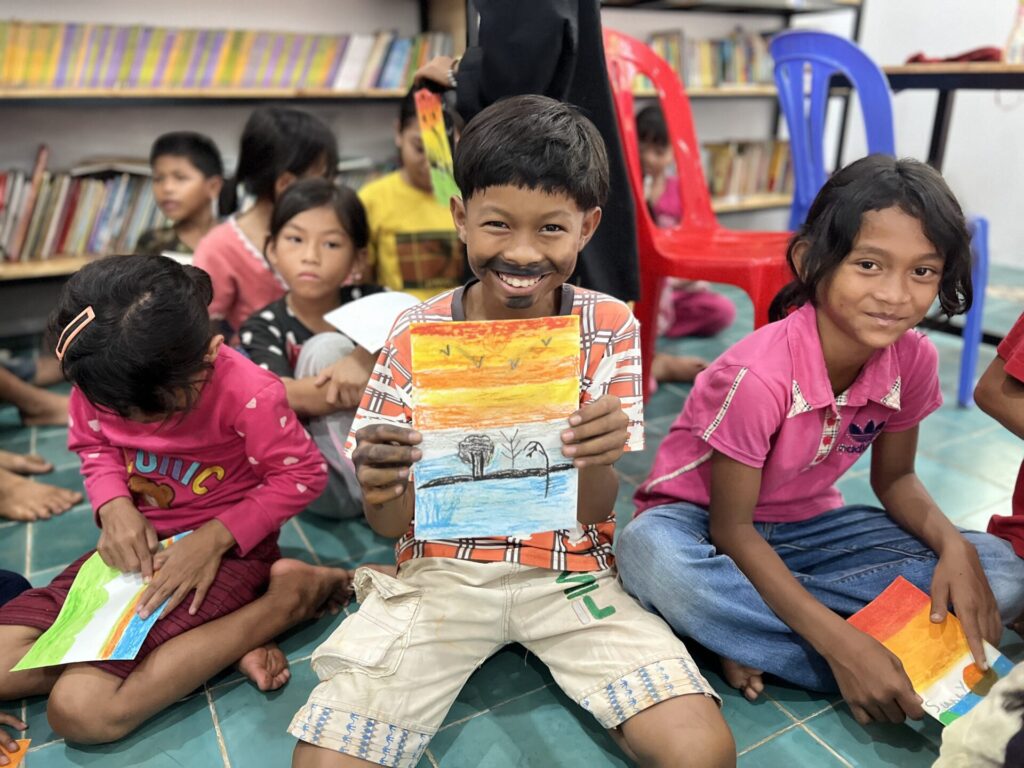
REACH students holding their paintings.
While we are proud of how far we’ve come, we look forward to the future, aiming to further strengthen our elective programs and provide even more opportunities for our students to explore specialised creative paths.
We are currently seeking passionate individuals to join us through our long-term intern or volunteer placements (4 weeks or more) to support our team with lesson plans and curriculum development. We are deeply grateful for our volunteers who have contributed time, resources, and skills to uplift our team and improve the standard of our educational services.
If you have experience in education or the arts and want to help us create a high-quality curriculum, we would love to hear from you. Your expertise can help ensure that every child at REACH is equipped with the interdisciplinary skills they need to succeed.
If you are interested in volunteering with us, click here to learn more. You can also contact our Placements Manager Sokly at sokly@reachsiemreap.org to start the discussion.

